#(으)세요
Text

How To Make Commands & Requests Using: (으)세요, 아/어 주다, & -지 마세요
V + (으)세요 = Please (verb)
usage:
- to politely request, suggest something, or make a command
- can also be used to end a question to make the question more polite. (Requesting info)
- Ex: 영어 하세요? = can you speak English?
Ends in consonant - 으세요
Ends in vowel - 세요
- 세요 is a shortened version of -셔요, which comes from the suffix -시. -시 is used to make verbs and adjectives more polite
- (으)십시요 is the same thing as -(으)세요, but is a very formal way of giving commands.
Examples:
거기 앉으세요 - Please sit there.
내일 시험이 있으니 열심히 공부하세요.
Since there is a test tomorrow, please study hard.
물 더 주세요 - Please give me more water
아/어 주다 - Give; To do something for someone
usage:
- 주다 on it’s own means “to give”
- By adding ~아/어 주다 to the stem of a word, you can imply that the action is somehow beneficial to you (or whoever the action is being done for)
- It’s almost as if you’re telling someone to do you a “favor” and do it for you
- Conjugate the first verb before adding 주다
- Usually (으)세요 is added to make your request more polite
> 아/어 주세요 = Please do for me
Examples:
창문을 열어 주세요.
Please open the window. (For me)
선생님은 저에게 설명해 줬어요.
The teacher explained it to me.
아/어 주다 + negative situations
usage:
- 지 말다 is used when telling somebody *not* to do somthing.
- you can put ~아/어 주다 and ~지 말다 together to create the meaning of “please don’t do it for me”
- V -지 말아 주다 (지 말아 주세요)
Examples:
수업 시간 동안 자지 말아 주세요.
Please don’t sleep in my class.
저를 쳐다보지 말아 주세요.
Please don’t stare at me.
-지 마세요 - Don’t do it
usage:
- this is a form of 지 말다, except it’s a different meaning than we just learned
- 지 마 means you are commanding someone not to do something (not for you, but just in general)
- 지 마 + 세요 = polite command
Examples:
가지 마세요 - Please don’t go
너무 빨리 먹지 마세요 - Don’t eat your food too fast
슬퍼하지 마세요 - Please don’t be sad
MORE EXAMPLES OF ALL:
어떤 책을 읽으세요?
Which book are you reading?
그걸 내일까지 해 주세요.
Please have it done by tomorrow.
앞으로는 더 조심해 주세요.
Please be more careful in future.
샐러드와 드레싱을 섞지 말아 주세요.
Please don't mix the salad and the dressing.
담배는 피우지 말아주세요.
No smoking, please.
목이 아프면 말을 많이 하지 마세요.
If you’re sick, please don’t talk a lot.
엘리베이터를 타지 말고 계단으로 올라가세요.
Please don’t ride the elevator, but go up the stairs. (Instead)
박물관 안에서 사진을 찍지 마세요.
Please don’t take pictures inside of the museum.
That's all for this lesson! If you are an intermediate learner looking for grammar lessons, you should check here!
#한국어#지 말다#-지 마#-지 마세요#아/어 주다#아/어/해 주세요#(으)세요#what does 주다 mean?#korean language#한국어 문법#korean grammar lesson#beginner korean#koreanstudyjunkie
32 notes
·
View notes
Text
One-Page Masterlist
안녕하세요! Hey everyone! I recently got an ask about my old masterlist, which is the same as my broken-down masterlist except it has all of my lessons on one page, rather than on multiple separate posts. Some may find this expanded version easier to navigate, so I’ll keep this up for y’all! My broken-up masterlist, of course, will still be available for those who find that more helpful :)
Hangul Lessons
Consonants
Vowels
Writing/Reading Korean Syllables
Some 받침 Rules
Diphthongs
Stroke Order
Some More 받침 Rules
Irregular Verbs
The Basics
Common Phrases
Numbers
Sino-Korean vs. Native Korean Numbers (Instagram Post)
Sentence Structure and Particles
Present-Tense Conjugations and Formal Language
Adjectives
Questions
Honorifics and Casual Language
Beginner
Negative Sentences
잘 and 못
Past Tense
Future Tense (-ㄹ / 을 것이다)
-ㄹ / 을 까요? (Shall we…? / I wonder…?)
-(으)세요 (Giving Commands / Asking Questions)
Telling Time
-고 싶다 (I want to…)
How to Say “And”
-지만 (However)
아/어/여서 (So…)
Negative Commands
Spacing (띄어쓰기)
Adverbs
ㅂ Irregular
Comparatives and Superlatives
난, 날, & 내가
Upper-Beginner
-(으)면 (If…)
아/어/여도 (Even though…/Even if…)
(으)면 되다 / 아/어/여도 되다 (I can…/You may…)
-아/어도 되다: Asking for and Giving Permission (Instagram post)
-(으)면 되다 & -(으)면 안 되다 (Instagram post)
아/어/여야 되다 and 아/어/여야 하다(Have to / Should)
Present Progressive (-고 있다)
How to Say “Or”
-아/어/여하다
All About 중
How to Use -(으)로
Before & After
-ㄴ/은 채로
Intermediate
Describing Nouns with Verbs (-는 것)
Describing Nouns with Verbs - Past & Future Tense (-ㄴ/은 / -ㄹ/을 것)
Nominalization
것 같다 (I think… / It seems…)
-러 가다 / -러 오다
-(으)려고 (In order to…)
-기로 하다 (to Decide to do Smth)
척하다 (To Pretend)
-게 되다
-군요 / -구나
아/어/여 보다 (to try…)
-은/ㄴ 적 있다 / 없다 (I have / have not)
-ㄹ/을 게요 (Future Tense)
겠다
-ㄹ/을 수 있다/없다 (I can / cannot)
-ㄹ/을 때 (When…)
-ㄴ/는다면 (If)
-(으)면서 and -(으)며
-(으)니까 (Because / So)
-아/어/여주다
-(ㄴ/는)다 (Narrative Form)
Quoting
Let’s…
Quoting continued
(으)ㄹ래요? (Wanna…?)
-죠
-대로
More Quoting - 대 & 래
잘하다 & 못하다 vs. 잘 하다 & 못 하다
-아/어 가지고
-(으)려면
-는 길에 & -는 길이다
-(으)면 vs. -ㄴ/는다면 (Instagram Post)
-았/었을 것이다
-느라고
-는 데(에)
-ㄹ/을 뻔하다
Upper-Intermediate
-ㄴ/는데
-(으)ㄴ/는지 (Whether or not)
-(이)라는…
All About 아무리
-잖아요
Expressing Surprise
-시 (Honorific)
Making Comparisons
-아/어/여지다
I might…
So that…/To the point where…
Causative Verbs
시키다
Passive Verbs (part 1)
Passive Verbs (part 2)
-ㄴ/은가 보다 & -나 보다 (I guess…)
-ㄹ/을수록
Other Meanings of 싶다
-자마자 & -는 대로(As soon as…)
-긴 하다
-치고
-김에
차라리 (Rather)
-(으)ㅁ Nominalization
-기는 무슨 & -기는 개뿔
-고 보니까
-듯(이)
버리다
-(으)면 좋겠다 & -(으)면 하다
-길 바라다
Advanced
-거든(요)
-줄 알다/모르다
-ㄹ/을 테니까 and -ㄹ/을 텐데
-았/었던
아니라 and 대신에
-ㄹ/을 리가 없다
편이다, 별로, and More
-지 그렇다 (Why don’t you…?)
-ㄹ/을 걸
-ㄹ/을 까 보다
-다면서요
-다니 part 1
-다니 part 2
뜻이다 & 말이다
-다가
-더라고(요)
-더니
Some colloquialisms: 아니시에이팅 and 뭐 이렇게
-(으)ㅁ Sentence Ending
-다 보니까
What does 따위 mean?
-ㄴ/는데도
Korean Idioms
Vocabulary
Must-Know People
Must-Know Places
Must-Know Things
Must-Know Verbs
Must-Know Adjectives
Countries
Months, Days of the Week, and More
Clothing (옷)
School (학교)
Autumn (가을)
Autumn (w/Pictures!)
More Questions
House / Apartment (집 / 아파트)
Emotions / Feelings ( 감정)
Animals (동물)
Loan / Konglish Words
Food and Drink (먹을 것과 마실 것)
Parts of the Body (몸)
Counters
Modes of Transportation (교통 수단)
Colors (색깔)
Colors (with Pictures!)
Weather (날씨)
Winter (겨울)
Music & Instruments (음악과 악기)
Baking Gingerbread Cookies
Emergency (비상)
Hygiene & Bathroom (위생 & 화장실)
Indefinite Pronouns
Work / Office (일 / 사무실)
Spring (봄)
Coronavirus Prevention (코로나바이러스 방역)
How to Wash Your Hands (손을 씻기)
Time (시간)
Korean Cuisine (한식)
Summer (여름)
Summer (여름) w/Pictures!
Graduation (졸업)
Identity (독자성)
Korean Text Slang
Similar Words
Makeup w/Pictures! (화장품)
Family (with Pictures!)
Pronouns
How to Say “Still” and “Already” in Korean
Tastes & Textures (맛과 질감)
K-Pop Audition
K-Pop Fandom Terminology
Different Ways to Say “Change”
Flower Names
What Does 원래 Mean?
What does 오히려 Mean?
College
Hanja Lessons
최
수
악
식
급
동
부 & 불
애
출
퇴
예
음
중
학
습
연
생
대
입
인
문
감
과
원
특
만
후
무
Charts
Present, Past, and Future Tense
Question Words
잘 vs. 못 and Negative Conjugations
Future Tenses
-았/었던 vs. -던 (at end of lesson)
Particles
Some 받침 Rules
Gifving Commands
Conjunctions and -아/어/여서 vs. -(으)니까
-(으)면 vs. -다/라면 and Different Ways to Say “And”
How to Say “Or” (at end of lesson)
Telling Time (at end of lesson)
Comparatives and Superlatives
잘하다 & 못하다 vs. 잘 하다 & 못 하다 (at end of lesson)
Comparing 잘하다/못하다, 잘 하다/못 하다, & 수 있다/수 없다
Irregular Verbs
Pop Quizzes
Level 1
K-Pop Breakdowns
TXT - “Cat & Dog”
Twice - “Feel Special”
Enhypen - “Fever”
2NE1 - “Go Away”
Lee Hi - “Only”
“기억을 걷는 시간 (Time Spent Walking Through Memories)”
KCM - “An Old Love Story (흑백사진)”
Taeyeon - “Can’t Control Myself”
Epik High - “Lost One”
Colde - “A Song Nobody Knows”
IU - “My Sea”
Enhypen - “Polaroid Love”
유라 (youra) - “하양 (RAL 9002)″
BTS - “Ddaeng”
Stray Kids - “For You”
Woozie - “어떤 미래 (What Kind of Future)
TXT - “Eternally”
LOONA - “Heart Attack”
Stray Kids - “Muddy Water”
LOONA - “Girl Front”
Pentagon - “Daisy”
BTS - “Sea”
Semester in SK
Nami Island (남이섬)
Things to Buy at Daiso
Shopping Phrases
Ordering Coffee
Signs in Korea
Ordering at a Restaurant
Riding the Seoul Subway
Things at the 편의점
Korean Curse Words
Etiquette in South Korea
Drinking Culture
Hanja in Real Life
Holidays in South Korea
Korean Cuisine
Concert Ticketing in South Korea
K-pop Comebacks in Korea
Summer in South Korea
What I Learned
#korean#korean language#hangul#korean grammar#korean vocab#korean vocabulary#learn korean#learning korean#langblr#Korean langblr#masterlist#apok#apopofkorean#study korean#studying korean#kpop#kpop lyrics#basic korean#beginner korean#intermediate korean#advanced korean#hanja#한국어#한글#한자#한국어 공부하기#한국어 배우기#한국어 문법#한국어 어휘#초급 한국어
2K notes
·
View notes
Photo





괜찮을 거예요 it will be okay
• 괜찮다 fine, alright, okay
• -을 거다 future tense (거예요/거야)
기운 내요! cheer up!
• 기운 force, spirit, energy
• 내다 muster (this is a word that means many things in diff. contexts)
얼른 나으세요 please get better soon
• 얼른 quickly, immediately, promptly
• 낫다 recover, get well
• -(으)세요 imperative, telling someone to do something
건강하게 다시 만나요! see you again in good health!
• 건강하다 healthy, strong
• -게 in such a way, so that (turns adjective into adverb)
• 다시 again
• 만나다 to meet
• -자 (informal)/-아/어/여요 (polite) let’s
쾌유를 빌어요 I hope you make a full recovery
• 쾌유 full recovery
• -을/를 object marking particle
• 빌다 pray, wish
58 notes
·
View notes
Photo

"특별한 기적을 기다리지마
눈 앞에선 우리의 거친 길은
알 수 없는 미래와 벽
바꾸지 않아
포기할 수 없어"
"Don’t wait for a special miracle
In front of us is our rough road
With unknowable future and obstacles,
I won’t change
I can’t give up"
"다시 만난 세계" (Into The New World) - Girls' Generation 소녀시대
✏️ 𝐕𝐨𝐜𝐚𝐛𝐮𝐥𝐚𝐫𝐲:
1. 특별하다 (adj): special
2. 기적 (n): miracle, wonder
3. 기다리다 (v): wait
4 눈 (n): eyes
5. 앞 (n): front
6. 거칠다 (adj): rough, coarse
7. 길 (n): road, way
8. 알다 (v): know, understand
9. 미래 (n): future
10. 벽 (n): wall
11. 바꾸다 (v): change
12. 포기하다 (v): give up
✏️ 𝐆𝐫𝐚𝐦𝐦𝐚𝐫:
1. Verb-지 마(요/세요) = Don't Verb ~ tell someone not to do something
E.g.
기다리다 (wait) + -지 마 --> 기다리지마 (Don't wait)
2. Adjective/ Verb -은/는/을 N = N that A/V ~noun modifier
E.g.
특별하다 (special) + 기적 (miracle) = 특별한 기적 (Special miracle)
거칠다 (rough) + 길 (road) = 거친 길 (Rough road)*
*ㄹ Irregular: When ㄹ 받침 is followed by ㄴ,ㅂ,ㅅ, ㄹ is removed from the stem and the ~ㄴ / ~ㅂ / ~ㄹ is added directly to the stem
3. Adjective/ Verb -지 않다 = Not A/V ~ Negation
E.g.
바꾸다 (change) + -지 않다 = 바꾸지 않다 (Do not change)
4. Verb + (으)ㄹ수없다 = Cannot Verb
E.g.
포기하다 (give up) + (으)ㄹ수없다 = 포기할 수 없다 (Can't give up)
#koreanvocabulary #KoreanGrammar #koreanquotes #studywithme #nctdream
🌸 🌼 🌻
Support Me Here
#좋은말#Korean Quotes#Korean Phrases#Korean Lyrics#snsd#girls generation#into the new world#Learn Korean#Study Korean#한국어#한국어 단어#한국어공부중#한국어수업#hangul#한국어배우기#한국어배우
20 notes
·
View notes
Text
like crazy — park jimin
[intro]
i think we could last forever
i’m afraid that everything will disappear
just trust me
[verse 1]
she’s saying
baby, 생각하지 마 baby, don’t think [about it]
> 생각 (n) thought
> 하다 (v) to do, perform
> v + -지 마(세요): (please) don’t [verb]
there’s not a bad thing here tonight
baby, 떠나도 좋아 baby, it’s fine even if you leave
> 떠나다 (v) leave, depart
> v/adj + -아/어/여도: even [if/though]
> 좋다 (adj) good, nice
있어 줘 오늘까지만 please stay [with me], just until today
> 있다 (v) be, stay
> v + 아/어 주다: like ‘please give + [v] ; used when you ask for something (a favour, for example)
> 오늘 (n) today
> n + - 까지: to [n]
> n + 만: only/just [n]
[verse 2]
watch me go
날 적셔 밤새도록 away [keep] me drenched all night
> 날 = 나 + 를
> 적시다 (v) wet
> 밤새 (v) stay up
> v + -도록: please read the explanation here :)
아침도 취해서 오지 않게 so that the morning is [gets] drunk and doesn’t come
> 아침 (n) morning
> 취하다 (v) to be drunk/intoxicated
> v/adj + 아/어서: because [v/adj]
> 오다 (v) come
> v + -지 않게: in order not to [v]
* in the mv, the translation is: so that the morning gets drunk and never comes
[pre-chorus]
시끄러운 음악 속에 희미해진 나 i’ve been blurred amidst the loud music
> 시끄럽다 (adj) loud, chaotic
> 음악 (n) music
> 속 (n) inside
> 희미하다 (adj) dim, blurred
> v + - 나(요): explanation here :)
*in the mv, the translation is: as the loud music plays, i’m fading away
드라마 같은 뻔한 story 익숙해져 가 like a cliché drama story, i’m becoming experienced [or used to it]
> 드라마 (n) drama
> 같다 (adj) such as, like
> 뻔하다 (adj) evident
> 익숙해지다 (v) to become experienced/skilled
*mv translation: i’m getting used to it
*another note: i’m not entirely sure about 가 as an ending here. if anyone knows, please lmk !
네가 알던 나를 찾기엔 멀리 온 걸까? have i come too far to find the me [you] used to know?
> 알다 (v) know, realize
> v + 던: used to [v]
> 찾다 (v) find, look for
> v + -기에는: too (A) to do (B) /for doing (B) | source!
> 멀리 (adv) far
> 오다 (v) come
> v + 으/ㄹ까(요): explanation here :)
yeah, i know
you know, i know
[chorus]
i’d rather be lost in the lights
lost in the lights
i’m outta my mind
이 밤의 끝을 잡아줘 please hold onto this night’s end
> 이 this
> 밤 (n) night
> 잡다 (v) hold, grab
> 끝 (n) final, end
매일 밤 you spin me up high every night you spin me up high
> 매일 (n) everyday
> 밤 (n) night
너를 품은 달 the moon that embraces you
> 품다 (v) embrace
> 달 (n) moon
> :explanation here :)
let me have a taste
part 1 | 2
➽───────────────❥
hi !! it has been A long long time :’) i love this song so much, so i thought of translating it and making a post while i’m at it !! i’m thinking of working on 사람 pt. 2 next, but i’m not too sure when since it’s finals season :’) currently on very very busy and tight schedule this whole month
anyway !!
if you see a grammar point or word you don’t see a separate line (breakdown) for, it’s likely that if you click on it, it’ll send you to a new window that contains the explanation :D i’ll be working on updating my grammar + vocabulary list !! and i’ll try to be active on twitter, so look for me on there !! if you want to be moots/mutuals, send me your username or dm me there !!
(it's also been a while since i've studied korean, so i may have lost some [or a lot actually] knowledge i've previously held ha ha)
also, corrections are so so appreciated !! please feel free to lmk if you see anything wrong above ^^
i’ll work on + post the remaining parts of this song when i’ve got some time to spare
that’s all for now :D
#park jimin#jiminbts#face album#like crazy#jimin like crazy#korean#learn korean#translation#korean translation#korean lyrics#travelkorea
2 notes
·
View notes
Text
2급 1과 🌹
V-(으)려고
Cannot be used with (으)세요 / (으)ㅂ시요 / (으)ㄹ까요 basically cannot be used in future tense
“Expresses intention for going, doing somewhere / in order to “
# 회사에 취직하려고 한국어를 열심히 배워요.
I am studying Korean hard to get a job in a company
# 늦어서 지각하지 않으려고 택시를 탔어요.
I was late so I took a taxi.
V - (으) 러
Only used with 오다 / 가다 / 다나다 / 만나다
All tenses + 세요 / 니다 / ㄹ까요
# 류진 씨가 머리를 바꾸러 미용실에 갔습니다.
Ryunjin went to the hair salon to change her hairstyle.
내일 먹을 빵 가러 가요
I’m going to buy bread that I’m eating tomorrow.
.🌹
0 notes
Text
✨A/V-(으)세요 and V-(으)십시요 grammar = (1) show respect, (2) making requests politely, (3) giving instructions formally✨
1 note
·
View note
Text
A/V STEM{*v}세요 • A/V STEM{*c}으세요
[...·se·yo] • [...·eu·se·yo]
(honorific speech) (haeyoche speech) (informal polite) (declarative/interrogative/imperative present) (showing respect towards the person mentionned)
If A/V STEM ends with a vowel ➡ 세요 ending
Else ➡ 으세요 ending
–세요/으세요 is a combination of the present tense ending –아/예요 [i·e·yo] and the honorific –(으)시– [(eu)·shi].
The honorific form is often used for polite requests, suggestions, commands. With the imperative tone, only actions verbs should be used.
Haeche speech (informal non-polite): V STEM(으)셔 [...(·eu)·shyeo]
🔗 Irregular patterns with 으
🔗 Speech Levels
🔗 Haeche Present & Haeyoche Present
#세요#으세요#seyo#euseyo#theme: 해요체#theme: haeyoche#theme: informal polite#theme: honorific conjugation#theme: tenses#theme: honorifics#셔#shyeo#으셔#eushyeo#theme: 해체#theme: haeche#theme: honorific haeyoche present#theme: honorific haeche present#theme: haeche present#theme: haeyoche present
0 notes
Text
(으)시 vs Deferential [Korean Honorifics]
anon asked: what’s the difference between 먹다 and 드시겠습니다. You say they both mean eat but i am confused? Help!
@femaletype asked: next do (으)시 vs -세요 vs -ㅂ/습니다 Bc honorific vs deferential is the bane of my existence
First, I will give a list of honorific verbs and nouns, then explain the honorific ending! It’s important to note an “elevation” of formality; who is being elevated! In this case, there are three types:
verbs that elevate* the subject
verbs that elevate the object
verbs that elevate the recipient of the action (usually used with the honorific particle 께)
*elevate = who are talking about in an honorific way?
높임말 동사; Honorific Verbs
(2) 만나다 / 보다; 뵙다 [to see, to meet]
(1) 먹다; 드시다 / 식사하다 / 잡수시다 [to eat]
(1) 마시다; 드시다 [to drink]
(3) 주다;드리다 [to give]
(1) 있다; 계시다 [to stay]
(1) 죽다; 들어가시다 [to die]
(1) 아프다; 편찮으시다 [to be hurt/in pain]
(1) 말하다; 말씁하시다 [to speak]
(1) 자다; 주무시다 [to sleep]
(3) 묻다; 여쭈다 [to ask]
(1) 배고프다; 시장하시다 [to be hungry]
(2) 데리다; 모시다 [to accompany]^
^ the plain form 데리다 is more commonly used as a compound verb with 오다 or 가다, but that can be it’s own separate post if people are interested.
높임말 명사; Honorific Nouns
이름; 성함 [name]
나이; 연세 [age]
집; 댁 [house]
생일; 생신 [birthday]
밥; 진지 / 식사 [food, meal]
병; 병환 [disease, illness]
술; 약주 [alcohol]
아이; 자제분 [child]
이; 치아 [tooth]
말; 말씀 [word]
It’s important to note, that outside of these specific verbs, you can realistically elevate any verb in Korean using (으)시.
-(으)시 vs. (스)ㅂ니다; Deferential Honorific
At this point, you should be familiar with plain style conjugation patterns (-어/아요). The deferential style is the infamous -(스)ㅂ니다 that gives the statements their formal ending. Of course, as we know, -(스)ㅂ니다 is more formal than -어/아요. If at any point, you are unsure as to which formality to use, always use the deferential style.
Honorifics can attach to both the deferential and polite styles, but are used in different contexts illustrated below:
[polite] 집에 가요 - I’m going home
[deferential] 집에 갑니다 - I go home
[polite + (으)시] 집에 가세요 - Go home, (hon. subject)
[deferential + (으)시] 집에 가십니다 - (hon. subject) goes home
Remember, you cannot, ever, at any point, ever, use (으)시 for yourself.
-(으)세요
When (으)시 is attached to the polite style conjugation, there are two usages; (1) to show respect, (2) to create an imperative.
The use of -(으)시 elevates the subject, object, or any recipient of the action who is older, in a higher position, or placed above you in respect. Of course, you will hear some Koreans complain about this politeness hierarchy, however, that is not an excuse to speak in an intimate way to a doctor, professor, or an elder--this is not about being close, this is about being respectful.
The biggest difference between the deferential -(스)ㅂ니다 and the honorific -(으)시 is that one acknowledges the elevation of the subject/object/recipient of action [-(으)시] while the other acknowledges the formality of the environment around them [-(스)ㅂ니다].
When talking to someone closer to your age (seemingly), you are able to use [polite + (으)시] to express politeness without being overtly formal. This is why, in restaurants, you will use phrases like:
순두부찌개 하나 좀* 주세요 - please give me tofu stew
물 좀 주세요 - please give me water
아아 한잔 좀 주세요 - please give me an iced americano
*좀 softens the request
Where the server will use an honorific term:
[드시다] 뭐 드시겠습니까? - what will you eat/drink?
[드리다] 영수증을 드릴까요? - do you want me to give you a receipt?
Note that the -까 creates an interrogative phrase.
All that said...
You can add (으)시 to any verb in order to create it’s honorific counterpart. This goes for literally any verb. If you are truly lost and cannot remember how to use the honorific form of 먹다 then you can use some form of 먹으시다. Examples:
[to answer/reply] 대답하다 + (으)시 = 대답하시다
[to sing] 노래부르다 + (으)시 = 노래부르시다
[to listen] 듣다 + (으)시 = 들으시다
Hope this helps! Honorifics are honestly difficult. So difficult, that even switching formality without honorifics is still considered rude (from intimate to plain to deferential). You’ll hear people say it’s okay to not use the proper formality because you’re a foreigner, but I think that’s a lazy solution to learning. If you want to learn properly, do it properly.
Example Sentences:
무슨 책을 읽으세요? - what book are you reading?
한국 분이세요? - are you Korean?
한국어를 가르칠 사람은 김 선생님이세요 - Mx. Kim will teach Korean
엄마가 전화하셨어요 - My mom called
부모님께서 은행에 가셨어요 - My parents went to the bank
That being said, it’s okay to mess up formalities so long as you catch the mistake and correct yourself. The listener (older Korean or friend) will greatly appreciate the self-assessment.
If there’s still some confusion, let me know!! Happy Learning :)
~ SK101
p.s. for more conjugations, you can go here!!
#korean#korean language#korean honorifics#honorifics#korean blog#korean language blog#korean langblr#koreanblr#kblr#klangblr#korean ask#ask#한국어#한국어 배우기#한국어 공부하기#한국어 문법#한국어 문화#(으)시#-(스)ㅂ니다#(으)시 vs (스)ㅂ니다
127 notes
·
View notes
Text
Journey to Fluency: 4일 - 210128
어휘 (Vocabulary)
My memrise deck
러시아: Russia
(으) 로: toward
마시다: to drink
마트: mart
만: 10000
만나다: to meet
만나서 반가워요: nice to meet you (informal)
만들다: to make
많다: to be many
많이: a lot, many, plenty
말하다: to speak
맛없다: to be tasteless, unsavory
맛있게 드세요: enjoy your meal
맛있다: to be delicious, tasty
맵다: to be spicy, hot; to be intense
먹다: to eat
멀다: to be far
멋있다: to be attractive, stylish, cool
메뉴판: menu
멕시코: Mexico
한자 (Hanja)
Links:
HowToStudyKorean
My memrise deck
人 = 인 (사람 인): person

시人 (시인)= poet
개人 (개인)= person(al)
人간 (인간)= man, human, mankind
子 = 자 (아들 자): person
Technically it’s called “son 자” but can be found in words where the meaning is male or female

여子 (여자)= girl
남子 (남자)= man
子식 (자식)= children
子녀 (자녀)= sons and daughters
의子 (의자)= chair
모子 (모자)= hat
탁子 (탁자)= table
父 = 부 (아비 부): father

父모님 (부모님)= parents
父친 (부친)= father
학父모 (학부모)= parents of children at school
母 = 모 (어미 모): mother

父母님 (부모님)= parents
母국어 (모국어)= mother tongue
고母 (고모)= father’s sister (aunt on father’s side)
이母 (이모)= mother’s sister (aunt on mother’s side)
男 = 남 (사내 남): man, male
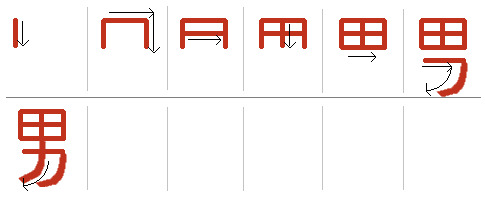
男子 (남자)= man
男성 (남성)= male
男녀 (남녀)= men and women
장男 (장남)= oldest son
男동생 (남동생)= younger brother
男편 (남편)= husband
女 = 여/녀 (계집 여/녀): woman, female

女자 (여자)= woman
女성 (여성)= female
女동생 (여동생)= younger sister
문법 (Grammar)
Book: Learn Korean with BTS 1 - Lesson 4: 오늘 어디에 가요?
N에 가다/오다
It’s used to indicate that the subject of a sentence moves to a particular place
If it moves from...
* The speaker’s current site to another → N에 가다
*From the current site to where the speaker is → N에 오다
AV (으)세요
It’s used to require or command someone to do something
If AV ends with...
*a consonant → AV으세요
*a vowel or ㄹ → AV세요
* ㄷ, this ㄷ changes for a ㄹ if it’s followed by a vowel
Happy learning!! ^^

#korean lesson#korean learning#korean language#korean langblr#한국어#한국어 공부하기#한국어 배우기#korean words#learn korean#korean
17 notes
·
View notes
Text

How To Make Negative Sentences
못 & -지 못하다 vs ㄹ 수 없다 | 안 vs -지 않다
WHAT ARE NEGATIONS?
What you’ll learn in this post is called negating. Basically, making a sentence negative. There are a ton of ways to do it and today, you’ll see the most basic and common ways. Examples of this in English are: Not, Can’t, & Don’t
Today We’ll Go Over:
~ 아니다 (opposite of 이다) = to not be
~없다 (opposite of 있다) = not exist, not have
~안 & 지 않다 = not, don’t + their difference
~ 못 & 지 못하다 = can’t do
~(으)ㄹ 수 없다 (opposite of ㄹ 수 있다)
= can’t & differences to grammar above
~ 지 마세요 (opposite of 세요) = don’t do it
I suggest you learn the counterparts/opposites first to make this lesson easier to understand and more useful.
아니다 - to not be
usage: the most basic way to identify that people and objects are not something.
Form: [Noun]이/가 아니다
conjugation forms:
아닙니다 (formal)
아니에요 (polite)
아니야 (informal)
아니였어요 (past - polite)
Examples:
이것은 내 것이 아니다
This is not mine.
진이 학생이 아닙니다.
Jin is not a student.
그날 당신이 본 사람은 제가 아니고 제 여동생입니다.
I wasn't the one you saw that day. It was my little sister
없다 - to not have, to not exist
usage: this can be translated a few ways, and thr most common ways are “there isn’t” & “to not have”.
Form: [Noun]이/가 없다/있다
재미있다(be fun) -> 재미없다 (not fun)
맛있다(delicious) -> 맛없다(not delicious)
Examples:
한국 친구가 없어요.
I don’t have a Korean friend. (to not have a friend)
저는 지금 집에 없어요.
I’m not at home now (to not be at home)
제 방에 티비가 없어요.
There isn’t a tv in my room. (to not exist or to not be)
안 V + 지 않다 - not, don’t
usage: these 2 mean the same things and are used interchangeably most of the time. although 지 않다 can seem a bit more formal. It’s translated as not or don’t.
the short form is 안 + verb/adjective
the longer form is verb/adjective + 지 않다
Examples:
저는 학교에 안 가요.
저는 학교에 가지 않아요.
I do not go to school.
When using the longer form, you should only conjugate the end -지 않다.
NOTE:
You shouldn't say 저는 집에 안 있어요 though, you would just use 없다 here.
If a verb is ‘noun+하다‘ such as 공부하다/일하다/숙제하다/운동하다/수영하다, the negation ‘안’ occurs between the noun and 하다.
Examples:
공부 안 하다 - don’t study
운동 안 하다 - don’t exercise
숙제 안 하다 - don’t do homework
못 V + 지 못하다 - can’t do
usage: 못 is also a negation adverb like 안, but it is usually used for verbs because it means ‘cannot’. And like 안 it goes right before the verb.
Examples:
학교에 못 가요.
I can’t go to school.
집에 텔레비전이 없어요. 그래서 그 프로그램을 못 봐요. I don’t have a TV at home, so I can’t watch that program.
지 못하다 is a long form for 못. 못 is used in front of verbs while -지 못하다 is used at the end of verbs. And -지 못하다 is a little bit formal than 못.
Example:
학교에 가지 못해요.
I can’t go to school.
시간이 없었어요. 그래서 숙제를 끝내지 못했어요.
I didn’t have time. So I couldn’t finish my homework.
Because 못 means ‘cannot’, it can be switched with ‘-(으)ㄹ 수 없다.
ㄹ 수 없다 - can’t
usage: 으)ㄹ 수 있다/없다 has two meanings, which are ‘ability’ and ‘possibility’. It can be translated ‘can/can not’ in English.
못 vs ㄹ 수 없다:
ㄹ 수 없다 gives more of a feeling that you physically cannot do something, but 못 is just that you can’t do something (for whatever reason). Largely they are interchangeable, so don’t worry too much,
Example:
그 사람은 한국어를 말할 수 없어요.
That person can’t speak Korean. (They literally do not have the ability to speak Korean)
돈이 없어서 살 수 없어요.
I don’t have money, so I can’t buy it. (I physically don’t have money, so I am unable to buy something)
-지 마세요 - Don’t do
Usage: Used to give a negative command. This can be translated as “don’t do” in English
You can’t use 지 않다 or 안 if you want to tell someone NOT to do something. This grammar is used for making commands only. For informal form, remove 세요.
Example:
학교에 가지 마세요.
Please don’t go to school.
너무 많이 먹지 마!
Don’t eat too much!
That's it for this lesson! Hope you learned something new and I have a ton more grammar lessons too, so don't be afraid to scroll through my last fee posts.
#한국어#korean langblr#korean language#korean grammar lesson#negations#the difference between 안 & 지 않다#안 vs 지 않다#the difference between 못 & ㄹ 수 없다#못 & 지 못하다#ㄹ 수 없다#한국어 문법#지 마세요#하지마#아니다#없다
46 notes
·
View notes
Text
Beginner & Upper-Beginner Lessons
Click here for the masterlist of all my lessons!
Beginner
Negative Sentences
잘 and 못
Past Tense
Future Tense (-ㄹ / 을 것이다)
-ㄹ / 을 까요? (Shall we…? / I wonder…?)
-(으)세요 (Giving Commands / Asking Questions)
Telling Time
-고 싶다 (I want to…)
How to Say “And”
-지만 (However)
아/어/여서 (So…)
Negative Commands
Spacing (띄어쓰기)
Adverbs
ㅂ Irregular
Comparatives and Superlatives
난, 날, & 내가
Upper-Beginner
-(으)면 (If…)
아/어/여도 (Even though…/Even if…)
(으)면 되다 / 아/어/여도 되다 (I can…/You may…)
-아/어도 되다: Asking for and Giving Permission (Instagram post)
-(으)면 되다 & -(으)면 안 되다 (Instagram post)
아/어/여야 되다 and 아/어/여야 하다(Have to / Should)
Present Progressive (-고 있다)
How to Say “Or”
-아/어/여하다
All About 중
How to Use -(으)로
Before & After
-ㄴ/은 채로
#korean#korean language#beginner korean#korean lesson#korean lessons#korean resource#learn korean#learning korean#study korean#studying korean#langblr#korean langblr#korean grammar#한국어#문법#한국어 레슨#한국어 공부하기#한국어 배우기#한국말
383 notes
·
View notes
Text
The Imperative Mood: ~아/어(요), ~(으)세요, ~아/어라, (으)십시오, ~지 말다
There are many ways to end a sentence. Depending on who you are speaking to (and many other factors) the way you end a sentence can vary tremendously. In the imperative mood as well, there are many different ways you can give a command to somebody.
Verb stem + ~아/어(요)
The easiest (and least formal) way to give a command in Korean is simply by adding ~아/어 to a verb stem. Adding ~요 to the ends of the sentences above make them more formal.
밥을 천천히 먹어(요) = Eat your food slowly
열심히 공부해(요) = Study hard
Notice that in both English and Korean, the subject isn’t usually used in a sentence when giving a command. This is because the person you are giving the command to is usually the subject, so it is omitted.
You can use this form when you are giving a command to somebody who is younger than you or the same age as you, or somebody who you are close with.
The formal addition of ~(으)시 could be added to the construction as well. In these cases, ~아/어(요) is added to ~(으)시다.
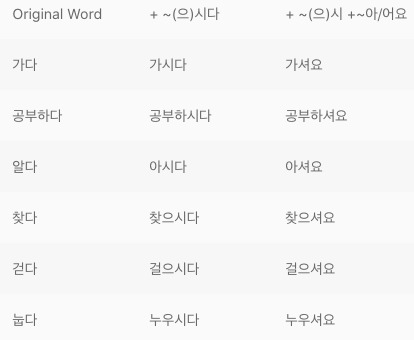
Notice that these imperative conjugations are no different than any regular present tense conjugation. For example, the following two sentences are conjugated into the present tense, but the addition to the verb is exactly the same as an imperative conjugation:
져는 월요일마다 운동해요 = I exercise every Monday
저의 할머니가 여기 에 자주 안 오셔요 = My grandmother doesn’t come here often
In these cases, distinguishing between a regular sentence and an imperative sentence is done through context.
이거를 봐요 = Look at this
빨리 올라오셔요 = Come up quick
먼저 올라가 = Go up first (you can go up first)
이 길에서 직진해요 = Go straight on this road
Although they differ in their respective levels of politeness, all of the above are acceptable ways to make a command. That being said using ~(으)셔요 is less common. Instead, the construction of ~(으)셔요 is often pronounced and written as ~(으)세요.
Verb stem + ~(으)세요
~(으)셔요 can be used as a formal way to make a command. However, nowadays, it is much more common to pronounce and write ~(으)셔요 as ~(으)세요. This can only be done when you see ~(으)셔요 and not with any other form that ~(으)시다 can create.
가셔요 = 가세요
공부하셔요 = 공부하세요
However,
가셨어요 can not be said as 가셨으세요
가셔 cannot be said as 가세
가시다 can not be said as 가세다
Only when you see ~(으)셔요 can you use ~(으)세요.
One of the reasons why you would add ~(으)셔요 to a word is if you were making a command. This means that ~(으)세요 can replace ~(으)셔요 in each of the examples above.
이거를 보세요 = Look at this
빨리 올라오세요 = Come up quick
이 길에서 직진하세요= Go straight on this road
More examples:
구고하세요 = Work hard! (A common greeting when people leave a place of business)
열심히 운동하세요 = Work out hard!
먼저 가세요 = Go first
칠판을 올려다보세요 = Look up to the board
시선을 돌리세요 = Turn away your eyes
보안을 위해 대통령을 내일까지 감시하세요 = For security, watch/guard the president until tomorrow
Imperative endings are often added to 있다 to command somebody to “stay” in a place or in a state. 있다 is often an adjective, but there are times when it is considered a verb. When telling somebody to “stay” like this, 있다 is seen as a verb.
집에 있어 = Stay at home (be at home!)
잠깐 여기 있어 = Stay here for a second
그냥 집에 있어= Just stay at home
The adverb 가만히 (to stay still or to not move) is often used in sentences like this to tell somebody to “stay” still.
가만히 있어 = Stay still!/Don’t move!
계시다 is the formal equivalent of this usage of 있다. When ~아/어요 is added to 계시다 to create a command, the construction 계셔요 is formed which you now know can be presented as 계세요. This is where the expression 안녕히 계세요 (which translates to “stay in peace”) comes from.
Use the ~(으)세요 form when giving a command to a person who deserves respect, but at the same time be aware of the ~(으)셔요 form in case it comes up.
~(으)셔요 can be added to make a command.
~(으)셔요 is also a regular present tense conjugation.
엄마는 매일 운동하셔요 = My mother exercises every day
When you see ~(으)셔요 can you use ~(으)세요.Therefore, the sentence above could also be used as:
엄마는 매일 운동하세요 = My mother exercises every day
This can be applied to any situation.
네, 가능하셔요 = 네, 가능하세요 = Yes, that is possible
(This is often heard when asking if you can do something [like use a card or combine coupons] at a store/restaurant)
이 분은 제 엄마이셔요 = 이 분은 제 엄마이세요 = This person is my mother
선생님, 어디 가셔요? = 선생님, 어디 가세요? = Teacher, where are you going?
그 사람이 언제 오셔요?= 그 사람이 언제 오세요? = When is that person coming?
Adding ~(으)세요 (or ~(으)시다) to a stem can create irregulars. If added to a word with the ㄷ irregular:
걷다 = to walk
걷다 + ~(으)세요 = 걷 + 으 + 세요
걷 + 으 + 세요 = 걸으세요
걸으세요 = walk!
If ~(으)세요 is added to a word with the ㅅirregular:
짓다 = to build
짓다 + ~(으)세요 = 짓 + 으 + 세요
짓 + 으 + 세요 = 지으세요
지으세요 = build!
One weird thing is that people rarely (if ever) say ~(으)세요 connected to 먹다 (to eat). Instead, it is much more natural to add ~(으)세요 to 들다 (which is a more formal way to say “eat”). Another change occurs when adding ~(으)세요 to verbs that follow the ㄹ irregular:
들다 = to eat (formal)
들다 + ~(으)세요 = 들 + 세요
들 + 세요 = 드세요
드세요 = Eat!
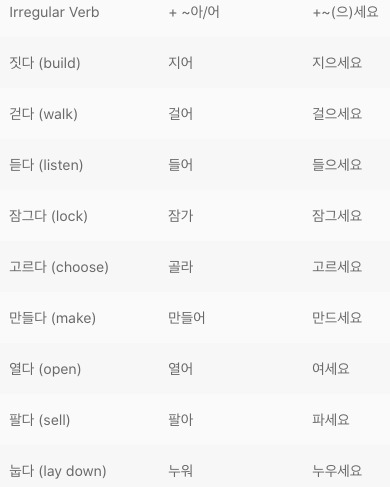
Verb stem + ~아/어라
Another way to give a command in Korean is by adding ~아/어라 to a verb stem. The formality is similar to the ~아/어 form you learned previously.
빨리 가라 = Go fast!
그렇게 해라 = Do it like that
내 말을 들어라 = Listen to what I say
밥을 먼저 먹어라= Eat (rice) first (you can eat first)
However, the ~아/어라 form is generally used by much older people (parents or grandparents) when they are giving orders to younger people. The formality is very similar (if not the same) as ~아/어, but I would much prefer to use ~아/어 over ~아/어라.
Verb stem + ~(으)십시오
Adding ~(으)십시오 to a verb stem is done in the same manner as when adding ~(으)세요. That is, the same irregulars come in to play. However, adding ~(으)십시오 to a verb stem allows you to give a command very formally for speaking to people who deserve a ridiculous amount of respect. If you were meeting your girlfriend/boyfriend’s grandparents for the first time, you might use this ending. It is also sometimes on government buildings/stores/restaurants on signs saying “come again,” etc.
여기서 내리십시오= Get off here (this is broadcasted in the Seoul subway at every stop)
To tell somebody to “go,” add one of the many ‘imperative mood’ conjugations to 가다 (in order of formality).
가다 + ~아/어 = 가!
가다 + ~아/어라 = 가라!
가다 + ~아/어요 = 가요!
가다 + ~(으)세요 = 가세요! (가셔요)
가다 + ~(으)십시오 = 가십시오!
Negative Imperative Mood: ~지 말다
You can also use the imperative mood to make a negative command to tell somebody not do something with 말다, which means “to not do something” or “to drop the intention of doing something”.
When used to make a negative command, ~지 말다 should be added to the stem of a word and then conjugate it using one of the many ‘imperative mood’ conjugations.
가지 말다 + ~아/어 = 가지 마
가지 말다 + ~아/어라 = 가지 마라
가지 말다 + ~아/어요 = 가지 마요
가지 말다 + ~(으)세요 = 가지 마세요
가지 말다 + ~(으)십시오 = 가지 마십시오
Notice that numbers 1, 2 and 3 go against the normal grammatical rules of Korean. 말다 is an irregular verb in this respect and no other verb follows this pattern. (These irregular conjugations only apply when specifically attaching the additions shown above. In all other situations, 말다 follows the ㄹ irregular like a normal verb ending in ㄹ.)
All five of those conjugations are possible. However, the two most common are # 1 and #4. When speaking to somebody informally, you will most likely hear 가지 마. When speaking to somebody formally, you will most likely hear 가지 마세요.
밥을 너무 빨리 먹지 마세요 = Don’t eat your food too fast!
부끄러워하지 마세요 = Don’t be shy!
그렇게 하지마= Don’t do it like that!
집에 가지 마 = Don’t go home!
앉지 마 = Don’t sit down!
여기에 오즘을 싸지 마세요 = Don’t pee here
권력을 남용하지 마세요 = Don’t abuse your power/authority
오늘이 유쾌한 날이라서 슬퍼하지 마세요 = Today is a delightful day, so don’t be sad
사람들을 학력 수준으로 평가하지 마세요 = Don’t judge people on the basis of education level
그 학생들에게 허가를 해 주지 마세요 = Don’t give those students permission
Ways to use these imperative sentences
~지 말고
You can also add ~고 ("and) to 말다 to make expressions such as “not ... but ...”, or “do not ... and do this .... [instead]”.
A 말고 B: When saying “not A, but B” where A and B are nouns, use 말고 between the two nouns.
우유 말고 커피 주세요 = Give me NOT milk BUT coffee ( Do not give me milk, give me coffee)
이거 말고 저거 살게요 = Not this one, but that one over there, I will buy it (I will buy that one over there, not this one)
내일은 여기 말고 다른 곳에서 만날 거예요 = Tomorrow, we are going to meet NOT here, BUT in a different place [instead] / Tomorrow we are going to meet at a different place rather than here.
[Verb A]지 말고 [Verb B]: When saying “do not do A, but/and do B” where A and B is a verbs, add ~지 after the verb stem of Verb A just like with sentences ending in ~지 마세요.
When used with verbs to connect a negative command with another clause, the clause after ~지 말고 is typically a positive command. This type of sentence is used when you want to tell somebody what not to do, and then also tell them what they should do.
매일 같은 운동을 하지 말고 많이 쉬세요 = Don’t do the same exercise every day, and get lots of rest
그렇게 하지 말고 내 말을 들어봐 = Don’t do it like that, and listen to what I have to say
한 사람에게 다 주지 말고 사람들과 동등하게 나누세요 = Don’t give them all to one person, hand/divide them out evenly
걱정하지 말고 그냥 해 봐요 = Do not worry and just give it a try
늦지 말고 일찍 오세요 = Do not be late and come early
전화하지 말고 문자 메시지 보내 주세요 = Do not call me but [rather] send me a text message
저 기다리지 말고 먼저 가세요 = Do not wait for me and leave first / Please go first without waiting for me
차가운 물에 넣지 말고 뜨거운 물에 넣으세요 = Do not put it in cold water but put it in hot water
지금 사지 말고 조금만 기다리세요 = Do not buy it now and wait just a little while
Giving Directions
Commonly used direction-like sentences:
오른 쪽으로 가세요 = Go right
왼 쪽으로 가세요= Go left
직진하세요= Go straight
건물을 지나가서 오른 쪽을 가세요= Go past the building, then go right
건물을 지나가서 오른 쪽으로 가지 말고 계속 직진하세요 = Go past the building, then don’t turn right, but keep going straight
Imperative Mood with ~아/어 보다
~아/어 보다 can be added to words to create a meaning that is similar to “attempt/try.”
엄마가 요리한 음식을 먹어 봤어? = Did you try the food mom cooked?
결혼하기 위헤 남자들을 만나 봤어요 = In order to get married, I tried meeting a lot of men
Just because of the meaning of “attempt,” it is very common to see an imperative ending attached to ~아/어 보다.
그것은 확인 해 봐! = (Try) check(ing) that!
이것을 먹어 봐! = (Try) eat(ing) this!
Although the typical translation of ~아/어 보다, in these cases is “try”, it is often eliminated.
Especially when used in the least formal imperative form (~아/어 봐), it is very common to see this used simply as a command without any meaning of “try/attempt.” Nonetheless, the meaning of “try/attempt” is often very subtle and doesn’t really change the meaning of much in the sentence.
여기 와 보세요 = Come here (Try coming here)
지금 앉아 봐 = Sit down (Try sitting down)
문을 열어 봐 = Open the door (Try opening the door)
먼저 가 봐 = Go first (Try going first)
이것을 봐 보세요 = Look at this (Try looking at this)
이거를 드셔 보세요 = Eat this (Try eating this)
이 차를 마셔 보세요 = Drink this tea (Try drinking this tea)
이 제품 수준을 높여 보세요 = Try to raise the level/standard of this product
그 강아지가 온순해 보여서 한 번 만져 봐 = That dog looks calm/gentle, so try touching it
직원이랑 잠깐 얘기해 보세요 = Try talking with a staff member
이 물체가 무엇인지 새각해 봐 = Try thinking about what this object is
Fixed Expressions
어서 오세요 = Welcome (lit. Come quickly)
안녕히 가세요 = Good-bye (lit. Go peacefully)
안녕히 계세요 = Good-bye (lit. Stay peacefully)
안녕히 주무세요 = Goodnight (lit. Sleep peacefully)
References
HTSK Unit 2 Lesson 40: The Imperative Mood: ~아/어(요), ~(으)세요, ~아/어라, (으)십시오, ~지 말다
TTMIK Level 2 Lesson 26. Imperative / -(으)세요
TTMIK Level 2 Lesson 27. Please do it for me. / -아/어/여 주세요
TTMIK Level 2 Lesson 30. Don’t do it. / -지 마세요
TTMIK Level 5 Lesson 19. To tell someone to do something / Verb + -(으)라고 + Verb
TTMIK Level 5 Lesson 24. Not A But B, Don’t do THIS but do THAT / 말고, -지 말고
Examples
~지 말다 attached to 내려가다 on a Korean sign
17 notes
·
View notes
Photo
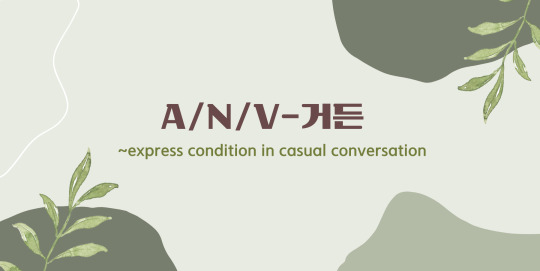
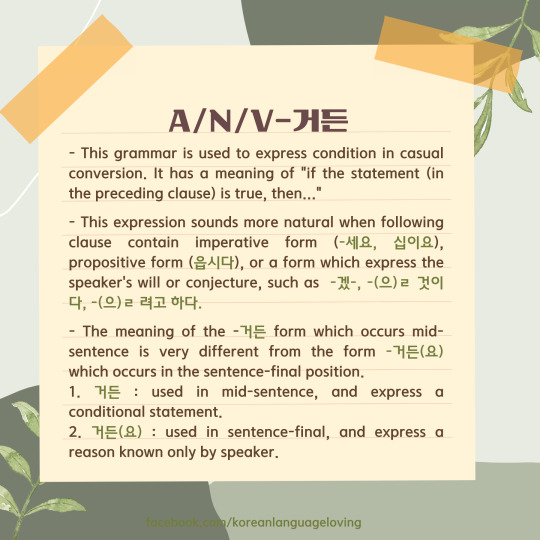
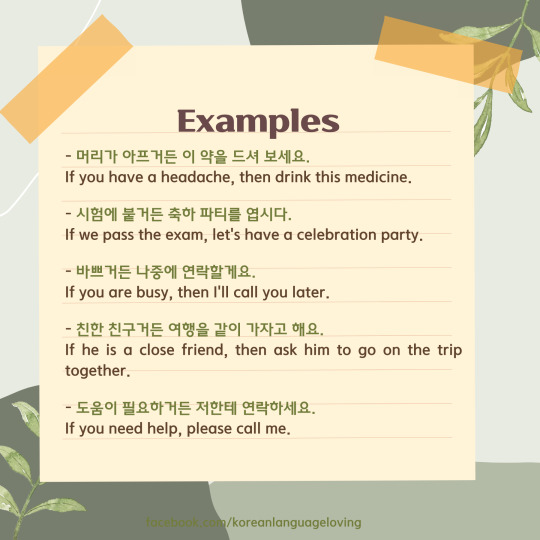
𝐊𝐨𝐫𝐞𝐚𝐧 𝐆𝐫𝐚𝐦𝐦𝐚𝐫: A/N/V-거든
✏️𝐔𝐬𝐚𝐠𝐞
- This grammar is used to express condition in casual conversion. It has a meaning of "if the statement (in the preceding clause) is true, then..."
E.g.
피곤하거든 오늘은 일찍 퇴근하세요.
(If you are tired, then leave work early today.)
✏️ 𝐒𝐩𝐞𝐜𝐢𝐚𝐥 𝐍𝐨𝐭𝐞
- This expression sounds natural when following clause contain imperative form (-세요, 십이요), propositive form (읍시다), or a form which express the speaker's will or conjecture, such as -겠-, -(으)ㄹ 것이다, -(으)ㄹ 려고 하다.
E.g.
아이가 아프거든 빨리 병원에 데리고 가세요.
(If your child is sick, take him to the hospital quickly.)
바쁜지 않거든 잠깐 만납시다.
(If you are not busy, then let’s meet for a while.)
방학을 하거든 배낭여행을 가겠어요.
(If I am on vacation, I'll go backpacking.)
✏️ 𝐂𝐨𝐧𝐣𝐮𝐠𝐚𝐭𝐢𝐨𝐧
𝐀/𝐕 -거든
Irrespective of whether the stem ends with a consonant or vowel add -거든 after the stem.
크다 --> 크거든 (if it is big...)
물어보다 --> 물어보거든 ( if you ask ...)
𝐍(이다)
With stems ending with consonant add 이거든
With stems ending with a vowel add 거든
학생 --> 학생이거든 (if you are a student...)
주부 --> 주부거든 (if she is a housewife,...)
✏️ 𝐂𝐨𝐦𝐩𝐚𝐫𝐢𝐬𝐨𝐧 𝐛𝐞𝐭𝐰𝐞𝐞𝐧 -거든 𝐚𝐧𝐝 -거든(요)
- The meaning of the -거든 form which occurs mid-sentence is very different from the form -거든(요) which occurs in the sentence-final position.
(1) 거든: used in mid-sentence, and express a conditional statement
E.g. 한국말이 어렵거든 매일 쓰기랑 듣기랑 읽기랑 말하기를 해야 해요.
(If Korean is really difficult, then you have to write, listen, read, and speak everyday.)
(2) 거든(요): used in sentence-final, and express a reason known only by speaker.
E.g. 왜 점심을 안 먹었어요?
- 아침을 너무 많이 먹었거든요.
(Why didn't you eat lunch? - Because I ate too much in the morning.)
✏️ 𝐂𝐨𝐦𝐩𝐚𝐫𝐢𝐬𝐨𝐧 𝐛𝐞𝐭𝐰𝐞𝐞𝐧 -거든 𝐚𝐧𝐝 - (으)면
Both grammars -거든 and - (으)면 express conditional statement. However, they have some differences as following:
(1) The clause after -거든 must be imperative form, propositive form, or a form which express the speaker's will or conjecture. Whereas -(으)면can be used with all types of sentences.
E.g.
고향에 돌아가거든 연락하세요 (o)
= 고향에 돌아가면 연락하세요. (O)
(If you’re back to your hometown, please contact me.)
수업이 끝나거든 집에 갑니다. (X)
수업이 끝나면 집에 갑니다. (O)
(When the class end, I go home)
(2) -(으)면 can be used to express a supposition while -거든 cannot.
E.g.
나이가 들거든 누구나 죽는다 (X)
나이가 들면 누구나 죽는다 (O)
(When getting older, everyone dies)
(3) -거든 is used in casual speech, between friends and from the older to the young. (으)면, on the other hand, is more polite and can be use in formal speech.
✏️ 𝐌𝐨𝐫𝐞 𝐄𝐱𝐚𝐦𝐩𝐥𝐞𝐬
1. 여보 이 옷 어때요? 저에게 안 어울리는 것 같지요?
- 이 옷이 마음에 안 들거든 다른 가게에 가 봅시다.
(Dear, how are these clothes? Wouldn’t you agree they’re not really my style?
- If you don’t like these, then let’s go to another store.)
2. 벚꽃이 피거든 여의도에 꽃구경을 하러 가요.
(If cherry blossoms bloom, let’s go to Yeouido to see flowers.)
3. 집에 도착하거든 전화 꼭 하세요.
(Make sure to call me when you arrive home.)
4. 지금 출발하거든 5시에 도착할 거예요.
(If I leave now, I'll arrive at 5 o'clock.)
5. 다른 사람들이 물어보거든 아파서 못 갔다고 전해 주세요.
(If my friends ask (about me), then please tell them that I am sick so that I can’t go.)
-
Kindly Visit My Blog Here
Available Products Here
Available Korean Writing Notebook Here
#Korean Language#Korean Grammar#Korean Hangul#Learn Korean#Study Korean#한국어문법#한국어 문법#한국어 배우기#한국어능력시험#한국어배우기#한국어 연습#한국어 공부하기#한국어
18 notes
·
View notes
Text
Beginner Level 2 is available now!

We've just opened Beginner Level 2, and currently, 5 stages are available as follows:
Stage 1: Particle 고(and) & 도(too)
Stage 2: Paste Tense 았/었다
Stage 3: Honorifics (으)세요
Stage 4: Past Honorifics (으)셨어요
Stage 5: Family Terms
—
Download our Korean learning app for free 💕
Google Play: https://play.google.com/store/apps/details?id=en.jhmedia.dekikan
Apple App Store: https://apps.apple.com/app/id1522272790
(Or search for “can korean” on Google Play or App Store directly.)
—
Follow CAN Korean for more updates :)
■ Facebook ■ Twitter ■ Instagram ■ Tumblr ■
—
#learn korean#learning korean#korean learning#free app#free korean app#free korean learning app#free korean studying#free korean study app#can korean#can korean app#korean grammar#korean grammar app#korean
2 notes
·
View notes
Text
What I learned today
(I’m too lazy to write up my whole study notes here now but here’s bascially what I learned today while studying Korean)
Progressive Tense / “-ing Form/ -고 있다”
Imperative / -(으)세요
Please do it for me. / -아/어/여 주세요
#personal#korean#korean language#learn korean#study korean#languages#language learning#studying#langblr#korean langblr#studyblr#ttmik#talk to me in korean#korean grammar in use#korean grammar#korean lesson#study notes
22 notes
·
View notes